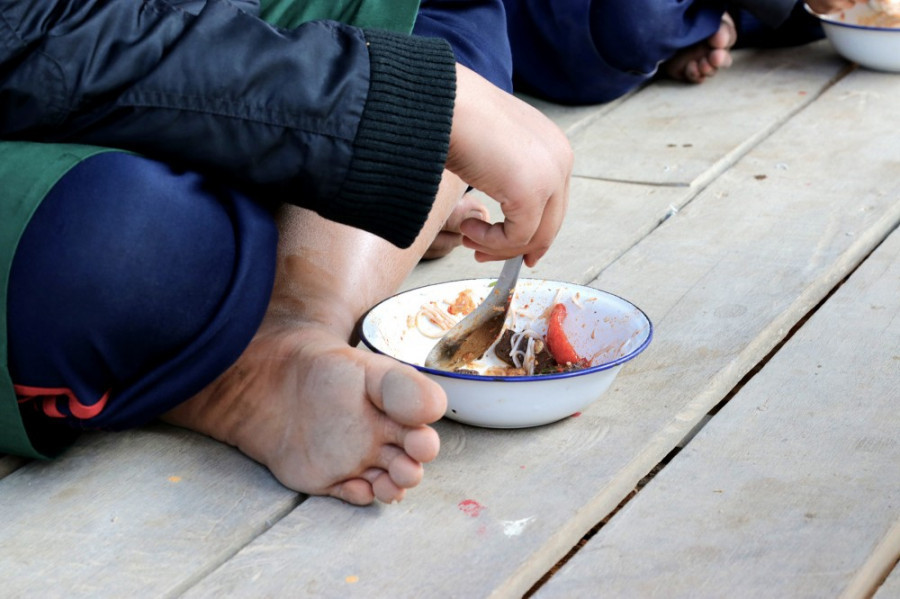Health
Covid-19 surge deprives 60 percent of malnourished kids of treatment
Lack of public transportation and conversion of nutrition rehabilitation centres into living quarters for health workers during the pandemic are given as reasons for halt in services.
Arjun Poudel
At a time when agencies under the Ministry of Health and Population have been focussed on containing the spread of the ongoing Covid-19 infections, thousands of severely acute malnourished children have been deprived of the treatment.
According to the nutrition section of the Family Welfare Division under the Department of Health Services, over 15,000 severely acute malnourished children, who need immediate care, used to be brought to health facilities for treatment in the normal time every year.
However, in the last eight and half months, only 4,000 such children reached health facilities for the treatment.
“Around 60 percent severely malnourished children have been deprived of treatment during the pandemic,” Kedar Prasad Parajuli, chief of the nutrition section, told the Post. “The number of severely acute diseases has definitely gone up because of the restrictions in place during the ongoing pandemic but we do not know the extent of this.”
Malnourished children are provided nutritious food and treated for any illnesses at nutrition rehabilitation homes, even for months until their condition returns to normal.
Malnutrition is considered to be a silent crisis in Nepal. According to Nepal Demographic Health Survey of 2016, the latest data which is available, 36 percent of the children under the age of five years were found to be suffering from chronic malnutrition, while 1 percent from acute malnutrition. Another 27 percent of the children were found to be underweight and 1 percent overweight.
Malnutrition is not only a problem of not getting enough to eat but also of lack of nutritious food, of lack of knowledge to use locally available foods and of the growing trend of giving junk foods to the children, according to Dr Aruna Uprety, a public health expert.
Nutritionists as well as child health experts have warned that if not treated on time, malnutrition in children will have long-term consequences not only in the children’s physical and mental health but also in the country’s overall development.
“Malnutrition not only affects the children's physical health but also affects their cognitive development,” Dr Shyam Raj Upreti, former director of the Child Health Division, told the Post. “Malnourished children will be stunted if they do not get the treatment. Such children are also prone to be affected by multiple non-communicable diseases as well in future.”
The Covid-19 pandemic is undermining nutrition across the world particularly in low-income and middle income countries, according to a Lancet report. “Strained health systems and interruptions in humanitarian response are eroding access to essential and often life-saving nutrition services,” the report said.
With public transportation not available during the ongoing restrictions, hundreds of people have been denied access to treatment at health facilities.
Moreover, several health facilities across the country have been converted into quarantine and isolation centers to place the infected and others suspected of being infected. Some nutrition rehabilitation centers— there are 22 in the country—had been converted into quarters for the health workers serving Covid-19 patients, according to the nutrition section.
“The nutrition rehabilitation centres are now operational,” Parajuli said.
Of the total under-five mortality rate, 53 percent are considered to be due to malnutrition in Nepal, which is 8 percent higher compared to the global average of 45 percent.
The pandemic has only made the situation of malnourishment worse.
“We do not have a record of the deaths of children under-five years of age because of malnourishment but malnourished children might have died due to lack of treatment during the pandemic” said Parajuli of the nutrition section.
Despite the health crisis that the country is under, the problem of malnourishment cannot be ignored because of its long-term consequences, according to public health experts.
“Health officials should find a way out to save our children from malnutrition,” Uprety, the public health expert, told the Post. “Instead of focussing only on distributing micronutrients like Bal Vita and others, we should focus on using locally available nutrition resources.”
Taking the help of thousands of female community health volunteers serving throughout the country to launch an awareness drive against malnutrition is also a possibility, Uprety added.




 25.17°C Kathmandu
25.17°C Kathmandu















